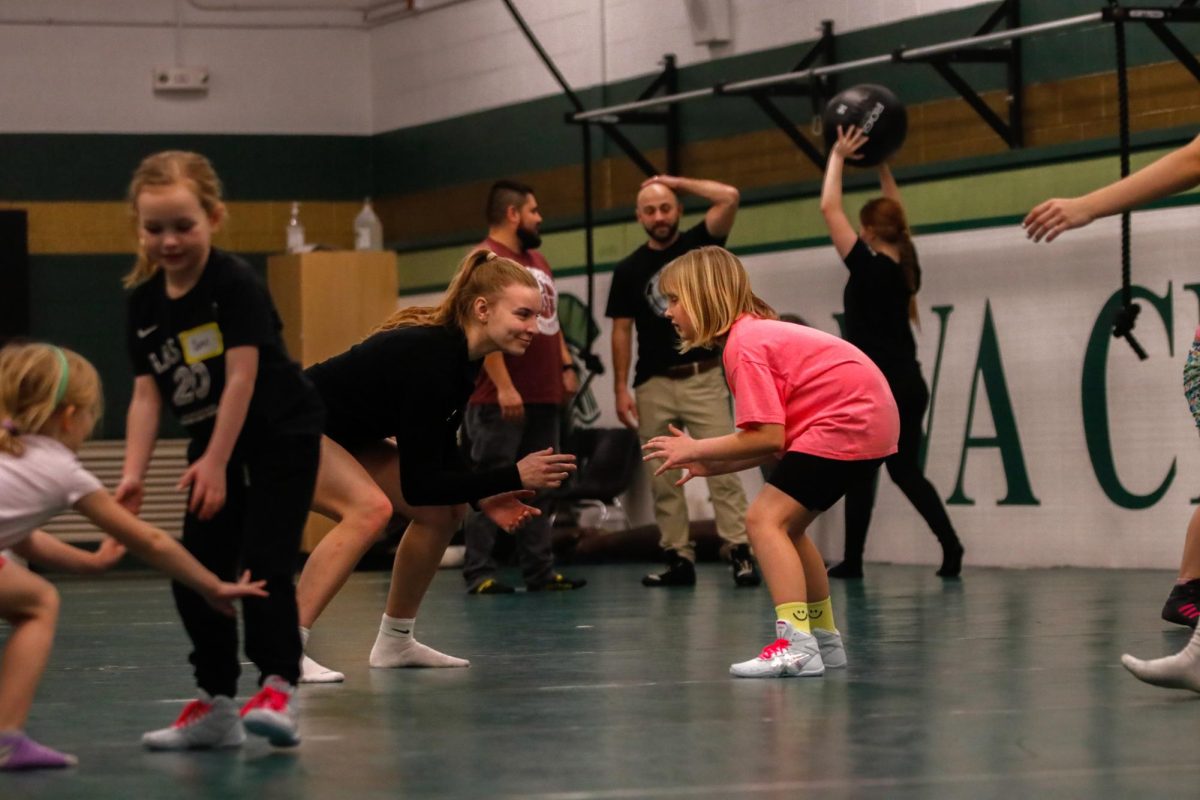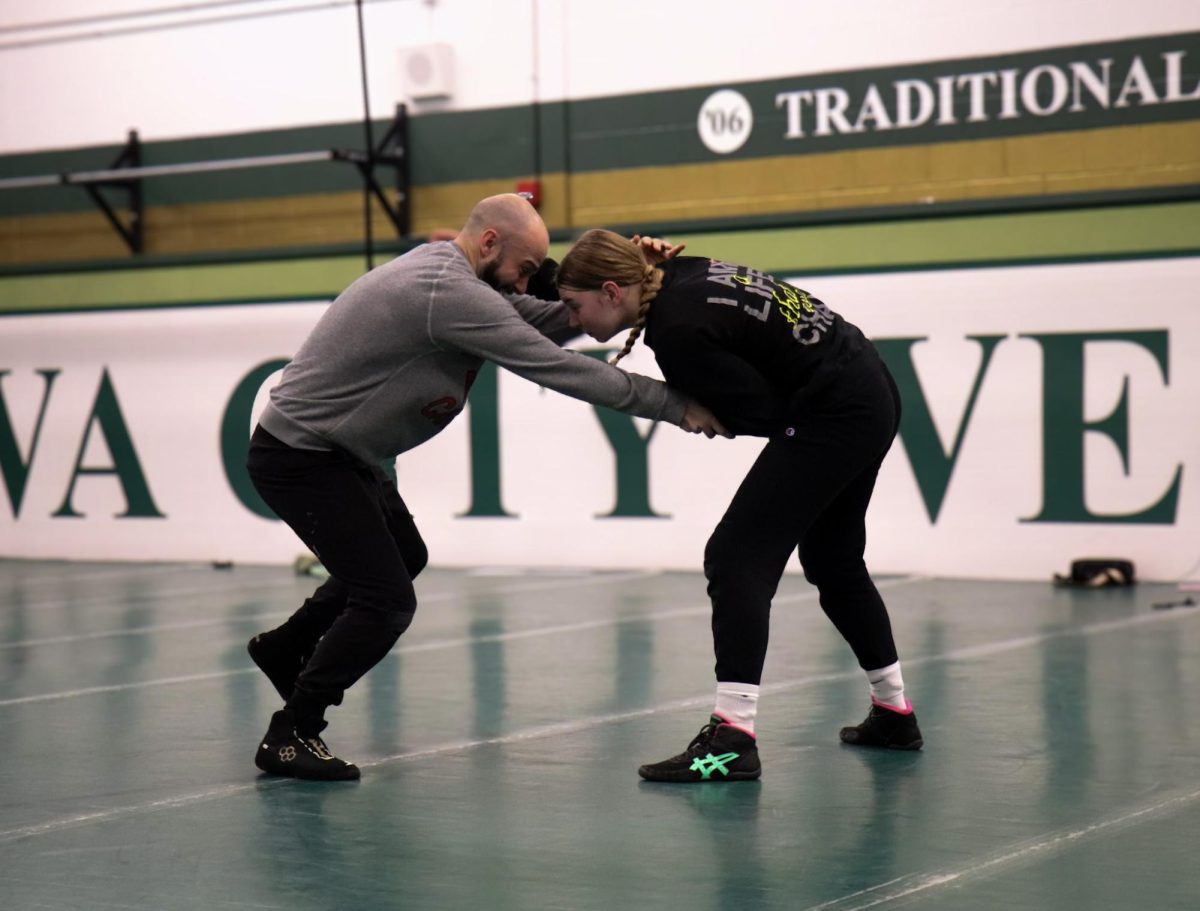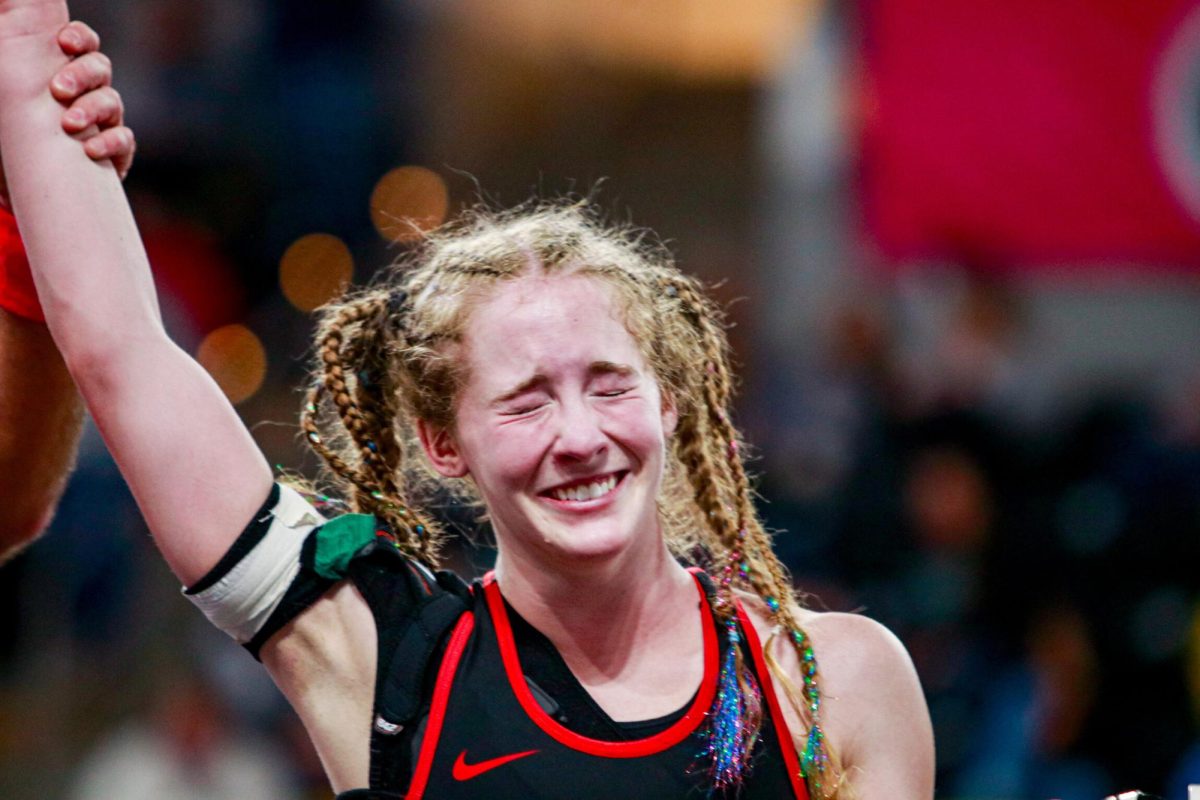How women’s wrestling found a home in Iowa City
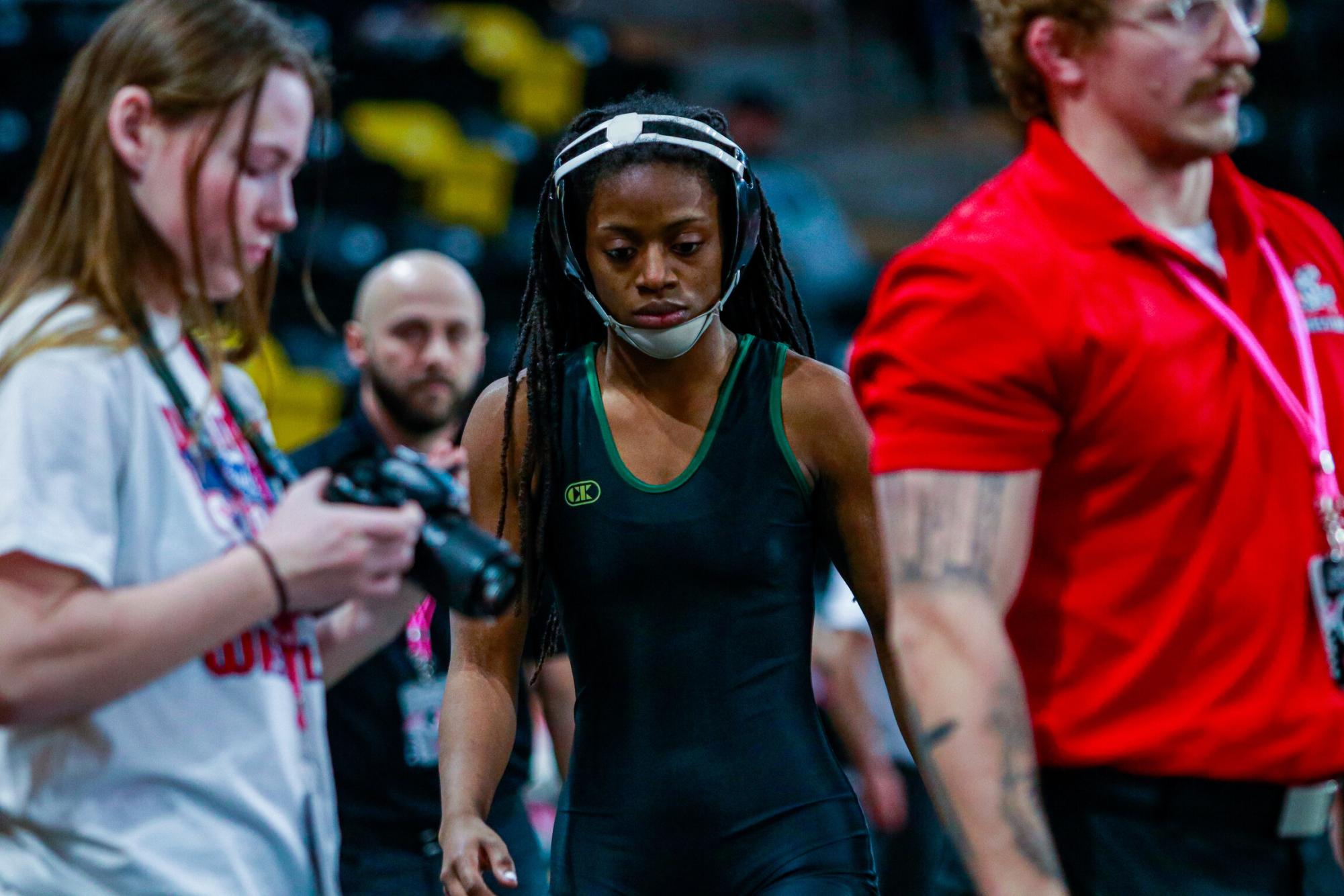
Girls’ wrestling has become the fastest-growing high school sport in the country, according to AP News, and Iowa City, nicknamed “Wrestle Town USA,” is no exception. From youth programs to collegiate teams, the sport is expanding rapidly at every level.
West High’s girls’ wrestling team was founded three years ago, following the sport’s official sanctioning by the Iowa Girls High School Athletic Union in 2022. This decision marked a turning point for female athletes, giving them the platform and recognition they had long deserved.
The momentum isn’t just at the high school level. Three years ago, the University of Iowa became the first school in the Power 5 conferences to establish a women’s wrestling team, another historic move that further legitimized the sport and inspired a new generation of athletes.
Continue for West Side Story exploration of women’s wrestling at every stage: from youth and club programs that serve as the foundation for young wrestlers to the rise of high school competition following official sanctioning to the impact of collegiate programs in paving the way for future opportunities.
Vanessa Hughes, a Gazette reporter and Iowa Women’s Wrestling Club board member, got involved with the sport after her kids, Hugo and Kona, started participating.
Both of her kids wrestle at Big Game Wrestling Club. Established in 2013, Big Game Wrestling Club is a nonprofit, private organization based in North Liberty, Iowa. Big Game is committed to helping young athletes and families achieve their athletic and life goals through wrestling and outdoor activities.
Kona started wrestling at a young age and now competes in the 12U category. When she first started, she was the only girl in the wrestling room and had to wrestle boys. She has since won boys’ state championships in all three styles: freestyle, folkstyle and Greco-Roman.
After girls’ wrestling was sanctioned, girls and boys were no longer allowed to wrestle in the same brackets. For younger athletes, though, that shift has created some challenges.
“It seems okay at the high school level, but for me, like at the elementary age, I think that she should still be allowed to wrestle with boys. [It’s] hard because she’s going to get better competition most of the time in the boys’ brackets,” Hughes said.
However, as the sport has grown, that dynamic has started to change.
“One thing we’re seeing change is that in some of the recent tournaments Kona has gone to, she would have gotten harder matches in the girls’ brackets than in the boys’ just because there’s more and more girls [wrestling],” Hughes said.
As the sport has grown, so has the number of girls in the Big Game wrestling room.
“She also has more wrestling partners that are girls in the room than other were before. A couple of these little girls, when she started, were the little sisters that came to their brothers’ practices at Big Game and they were like, ‘I want to wrestle like Kona.’ Now they’re just wrestlers, they compete in all the same tournaments and come to practices and everything,” Hughes said.
Closer to home, West High hosts its own wrestling club for girls in second to eighth grade. On some Monday afternoons after high school practice wraps up, a group of around 11 girls gathers to play games and learn the basics of the sport.
Some of the high school wrestlers, including Lila Bihun ’27, occasionally jump into the practices to help out. While Bihun mostly watches and does homework, she enjoys the time spent with younger wrestlers.
“[The] games are super fun and evolving, and they seem to have a lot of fun, especially pairing with the little girls, just for them to get to learn stuff and really engage with older girls,” Bihun said.
According to West’s girls’ wrestling head coach, Michael Mettenburg, getting girls involved at younger ages is key to growing the sport.
“It starts with little kids getting little girls excited about being in the wrestling room,” Mettenburg said.
That early investment is starting to pay off. Northwest Middle School launched its girls’ wrestling program last year, creating a direct pipeline to the high school team.
“It really starts with Northwest. If Northwest can get girls interested at Northwest, when they come here, it’s way lower-hanging fruit for me to be like, ‘Hey, do you want to come? We’ve got practice today,’ and that happened with a ton of freshmen this year.”
That foundation has led to West’s team being majority freshmen this season, all of whom came in with experience gained from wrestling at Northwest.
Youth involvement is paving the way for high school programs to thrive. At West High, the momentum from younger wrestling clubs is already making an impact as more girls enter the high school scene with experience under their belts.
West High’s girls wrestling team became officially sanctioned in 2022, marking a significant milestone for the school. This effort was spearheaded by Kody Pujil, Earth and Space teacher and Assistant Boys Wrestling Coach, who initially sought to establish a program in the summer of 2019.
Pujil’s journey began by gauging interest from students; in the fall of 2019, he distributed a survey to the student body, and following that, he held an informational meeting with the girls who expressed interest.
“In the winter of 2019, we started with 23 girls. By the end of the season, we still had 19-20 girls on the roster,” Pujil said. “They competed at the unofficial state tournament with Mami Selamani ’20 placing second and Salima Omari ’20 winning a state title. This group of girls was the first wrestling team in West High history. However, since the sport was unsanctioned, their records are not counted.”
To officially sanction the sport in Iowa, the IGHSAU set certain requirements.
“Individual districts had to establish a girl’s program, show funding for the program, commitment of coaches, show they had uniforms and practice space. Once this number was reached, then the state sanctioned girl’s wrestling. This was a multi-year effort by a lot of committed individuals,” Pujil said.
To Pujil, the impact of girls wrestling has been profound, providing opportunities that weren’t available before.
“Girls’ wrestling gave an entire population of students a chance to learn, compete and succeed in something that they never had true access to before. After our first unofficial season, two of the wrestlers earned full-ride scholarships to compete in wrestling,” he said.
Looking back on how far the program has come, Pujil expressed pride in the rapid growth of the sport.
“It is amazing to see where girls wrestling is now and where it came from in five years: from an unofficial state tournament, becoming the fastest growing sport and now already having to split into two classes. I would really like to see the program at West High continue to grow and more girls take the chance to give it a try.” Pujil said.
Since West High officially established the girls wrestling program, participation has increased. This season, the team’s roster is dominated by freshmen, a shift Mettenburg credits to the foundation laid at Northwest.
“Like over half the team is freshmen, and that is not a product of me or my assistant coaches. That’s a product of what they did last year at Northwest,” he said.
Mettenburg is in his first year as head coach after Elijah Sullivan stepped down last year. While he had hoped for a woman to take on the role, he was willing to take on the responsibility, recognizing the importance of building a solid program for the girls.
“I really care about the team and I would love to see West have, like, a really good girls wrestling program and be perennial competitors at the state tournament, and just be a solid program,” Mettenburg said.
The growth of girls wrestling in Iowa has been dramatic in recent years, with an increasing number of teams and wrestlers joining each season.
Previously, West struggled to fill its entire varsity roster. However, now, although the team still lacks wrestlers in the lightest weight classes like 100 lbs, the varsity lineup is nearly full, and a JV team has been established to provide further opportunities for growth.
During the first year of the program, the team was already showing promise. Jannell Avila ’23 emerged as a standout competitor, making it to the state tournament and competing in the finals match during her first year on the team. Her success didn’t stop there — Avila went on to wrestle at Baker University, continuing her wrestling career at the collegiate level.
Her early success and leadership left a lasting mark on the program.
“She’s kind of like that North Star for our program. We have a team handbook, and her pictures are on it, at the podium. She’s great because our first year, all of a sudden, now all the girls have a bar that they’re reaching for. When you have that model in your school, you think it’s more attainable, like that’s something I can do. So her legend lives on,” Mettenburg said.
In the second year of the program, West saw even more success on the mat. Trinity Myers ’25, Helen Orszula ’24 and and Peyten Van Dyke ’27 all qualified for the state wrestling tournament, building on the momentum from the team’s first year. That same year, Northwest introduced its own girls wrestling team, which has had a noticeable impact on the high school program.
One of the athletes benefiting from that pipeline is Noah Overholt ’28, who wrestled at Northwest before joining West’s team. Overholt has already made a strong impression this season, quickly becoming one of the team’s top performers.
She has worked her way from the JV roster to varsity after showcasing impressive dedication. Overholt has the third-most takedowns on the team, and her relentless work ethic has earned her a spot on the varsity roster at 125 lbs.
“She’s such a hard worker. She’s at every practice, and she never misses one,” Mettenburg said.
When reflecting on her success, Overholt credits the program at Northwest for helping her build a foundation.
“At Northwest, obviously they don’t teach everything in detail but they teach the important things to a degree that’ll work,” Overholt said.
As the high school program continues to grow, girls wrestling in Iowa is quickly gaining momentum and making history. This year marks the third year that high school girls wrestling has been officially sanctioned as a sport in the state, and for the first time, it is split into two classes. Iowa now boasts 162 programs representing girls wrestling, a significant milestone that reflects the rapid growth of the sport.
West High’s Myers competed at the state tournament for the second year in a row, finishing with a 1-2 record. She wrestled the final match of her high school career at the tournament. Although Myers may not have made it to the finals, there is a bright future ahead for the girls’ wrestling program at West High, as young athletes like her continue to pave the way for success.
As girls wrestling gains momentum at the high school level, the opportunities to compete beyond high school are also expanding. The University of Iowa became the first Division I Power 5 school to establish a women’s wrestling program in 2021, marking a major step forward for the sport.
This growth is partially driven by Title IX regulations, which require athletic opportunities to reflect student body demographics. Since women now make up around 60% of university enrollments nationwide, schools have had to adjust their athletic programs to reflect that balance. For Iowa, this meant cutting men’s tennis, swimming and gymnastics programs a few years ago to remain compliant with Title IX, but it also opened the door for adding women’s wrestling.
The addition of the Iowa women’s program has created a ripple effect. Now, more girls are entering high school wrestling with the possibility of continuing their careers at the collegiate and even professional levels. However, challenges remain.
“Once the athletes graduate, a lot of times they want to keep competing, like at the Olympic level or the World Cup level. But they can’t always train while also making money, and working a job,” Hughes said.
To help bridge that gap, the Iowa Women’s Wrestling Club was created to support athletes after graduation. The organization provides resources and financial assistance to allow wrestlers to continue training and competing at the highest levels.
“We have fundraisers, and we raise money so that we can support athletes that want to compete later,” Hughes said.
Interest in women’s wrestling at the collegiate level is growing, and the sport recently hit a major milestone. The NCAA officially sanctioned the first-ever Women’s Wrestling Championships, set to take place in the winter of 2026. The announcement marks a turning point for women’s wrestling, elevating the sport to the highest level of collegiate competition.
This momentum is reflected in Iowa’s dominance on the mat. The team, ranked first all season, capped off a historic year by winning the National Collegiate Women’s Wrestling Championship for the second year in a row with 201.5 points, finishing ahead of North Central College, which scored 181 points.
At the tournament, Iowa finished with four national champions, and all 15 team competitors placed in the top seven. Standout athletes like Kennedy Blades, Macey Kilty and Kylie Welker are leading the charge, who have already made names for themselves on both the national and international stages.
Kennedy Blades has established herself as one of the most dominant wrestlers in the world. She won a silver medal in the women’s 167 lb event at the 2024 Summer Olympics in Paris, France. Blades’ success began early, at just 17, she was the runner-up at the 2020 Olympic Team Wrestling Trials. She also made history as the first female to win a state title in Illinois while competing against boys.
Macey Kilty’s is equally as impressive. A seasoned competitor on the world stage, Kilty was the runner-up at the 2020 United States Olympic Trials and placed second at the 2019 Wrestling World Cup in women’s freestyle for Team USA. She also secured second place at the prestigious Golden Grand Prix Ivan Yarygin in 2022 and finished as the runner-up at the U-23 World Cup in both 2018 and 2019.
Kylie Welker won her second NCWWC National title at 180 lbs and was named the 2024 Open Mat NCAA Women’s Wrestler of the Year. A consistent performer, Welker was ranked nationally in the top three of her weight class for the entire 2023–2024 season. Her success earned her finalist for USA Women’s Wrestler of the Year and was named a USA Wrestling Athlete of the Week.
Iowa’s depth and talent at every weight class show why the program has become a standard in women’s wrestling. With athletes like Blades, Kilty and Welker leading the way, it’s clear that Iowa’s dominance isn’t slowing down anytime soon.
As Iowa continues to set the bar, there’s still room for growth in women’s wrestling nationwide, both at the youth and collegiate levels. Increasing competition, exposure and funding will be key to continuing this momentum and ensuring that more girls feel empowered to take up the sport.
Although women’s wrestling is the fastest-growing sport in the country, there’s still a ways to go, both at the youth and collegiate levels. Increasing competition, exposure and funding will be key to continuing this momentum and ensuring that more girls feel empowered to take up the sport.
That visibility is especially powerful in Iowa City, where wrestling is deeply rooted in the community. The success of the women’s program not only builds on that legacy but also creates new opportunities for the next generation of wrestlers.
“Having this in the Iowa City area where there’s so many young girls that are strong, independent and that could add so much value to the women’s wrestling team in the future — it gives them that availability, just like I could have used when I was a kid,” Bihunn said.
Your donation will support the student journalists of West High School. Your contribution will allow us to purchase Scholarship Yearbooks, newsroom equipment and cover our annual website hosting costs.
-
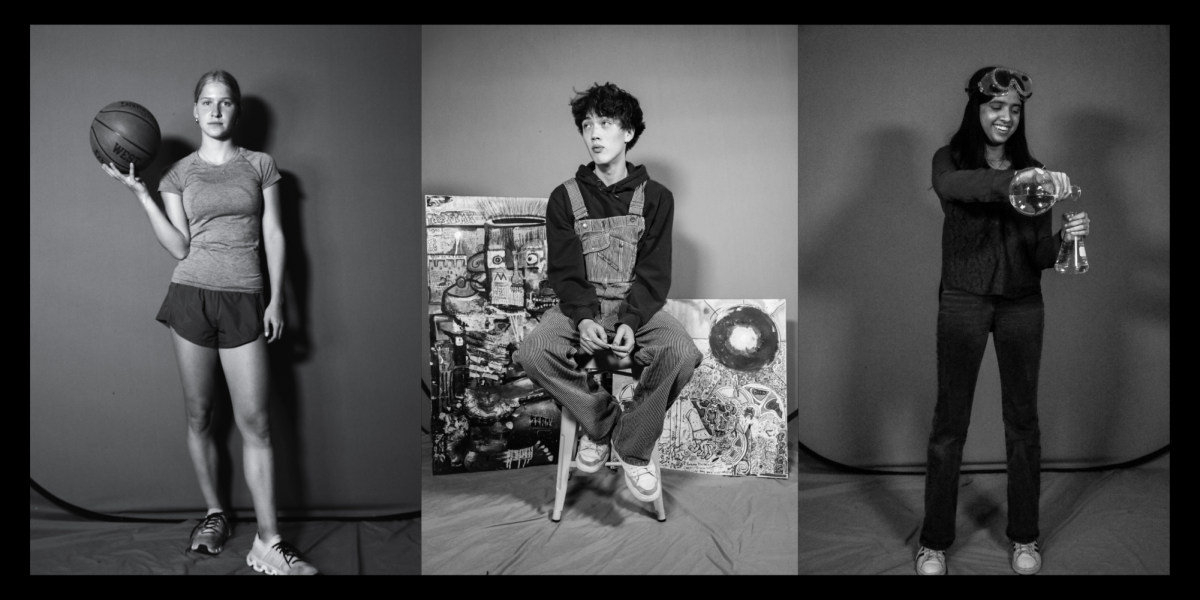 FeatureWSS 2025 People of the Year
FeatureWSS 2025 People of the Year -
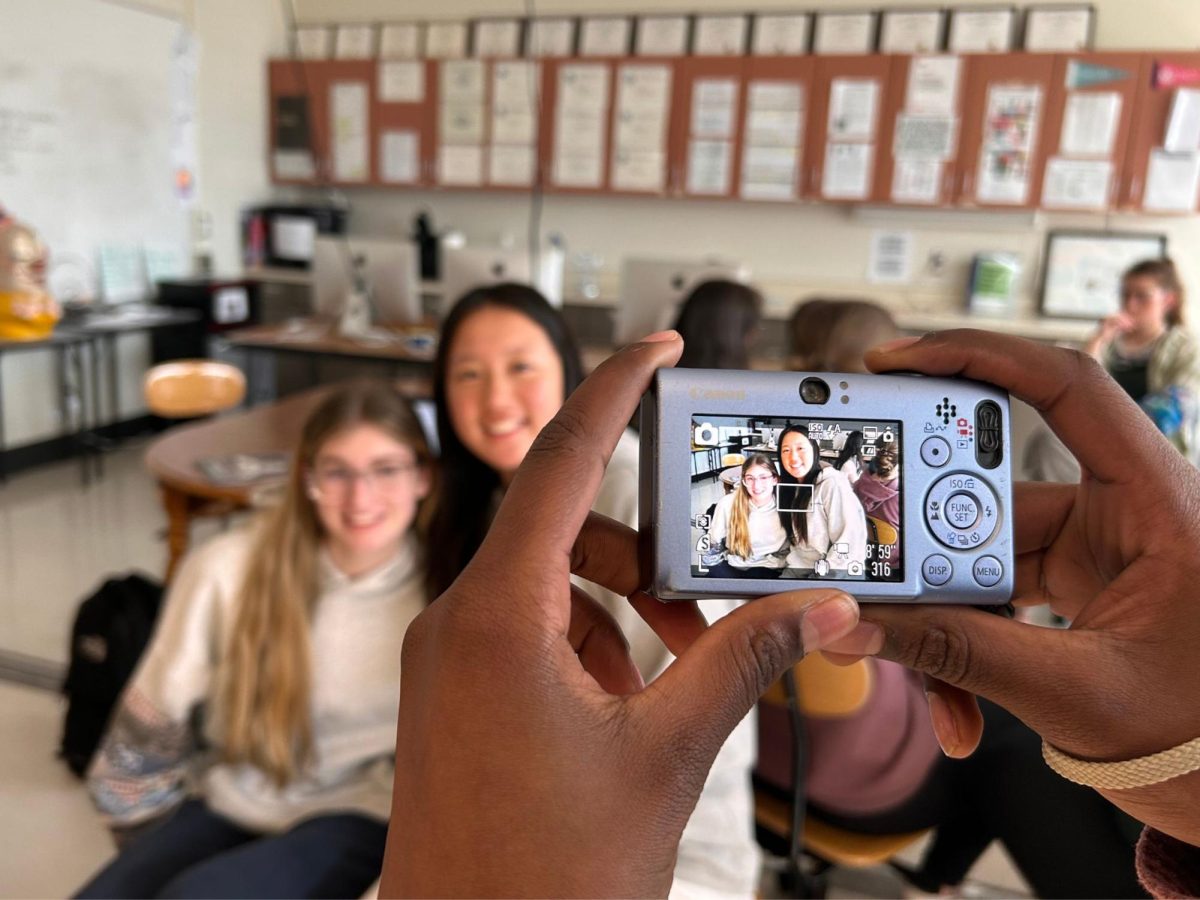 FeatureGone digital: the return of digital cameras
FeatureGone digital: the return of digital cameras -
 FeatureMiles for mental health
FeatureMiles for mental health -
 FeatureService and sacrifice
FeatureService and sacrifice -
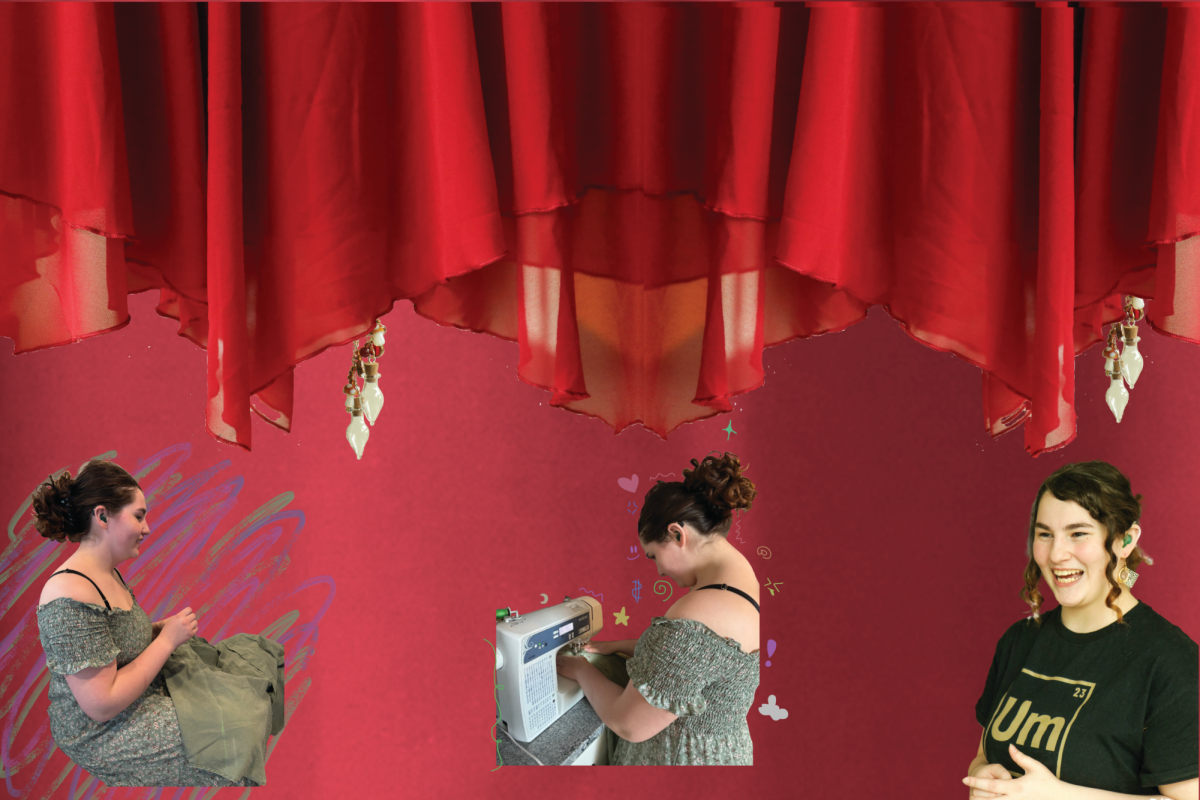 FeatureStitching sustainably
FeatureStitching sustainably -
 FeatureSenior futures
FeatureSenior futures -
 FeatureBrad Stiles: championship caliber coaching
FeatureBrad Stiles: championship caliber coaching -
 FeatureBack in time
FeatureBack in time -
 FeatureDriven, dangerous and distracted
FeatureDriven, dangerous and distracted -
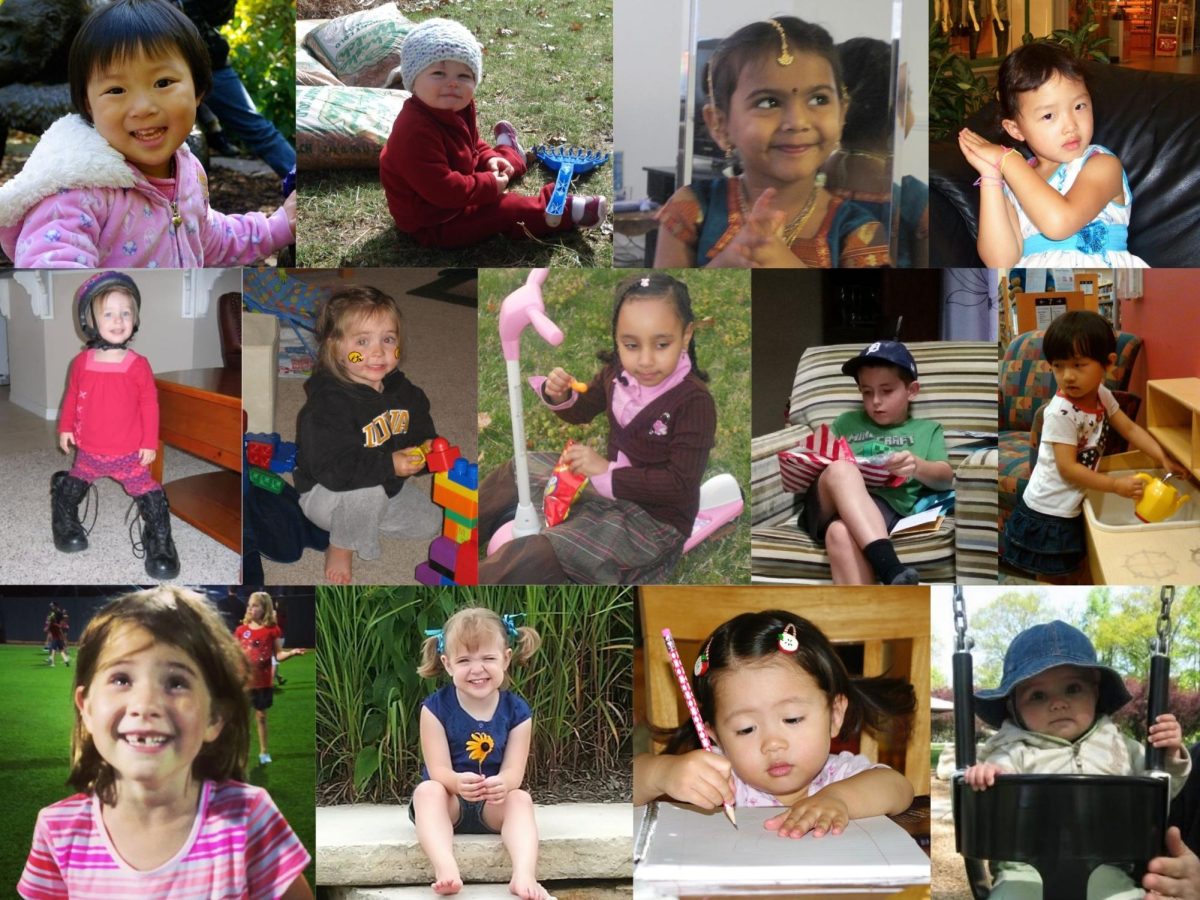 FeatureClass of 2025 senior columns
FeatureClass of 2025 senior columns



